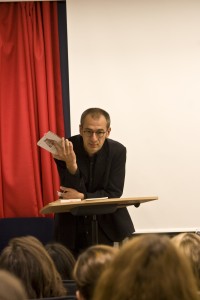
All my dreams of inventing a time machine and going back to witness the (in)famous Avant-Garde had long ago faded, when the Russian-American poet Eugene Ostashevsky came to Bard College Berlin. He came and opened his reading with a poem of the Russian “absurdist” Daniil Kharms (1905-1942), whom he has translated. “The four-legged crow”, which is the poem he read, starts like this—“There once lived a four–legged crow. Properly speaking, it had five legs, but this isn’t worth talking about”—and it only gets better. I don’t know how Kharms read his poems, but Ostashevsky’s intransigent, almost violent diction is something Kharms himself would have probably liked to borrow. By contrast, another translator of Kharms, Matvei Yankelevych, who also seems to have the habit of opening his readings with a poem or two from the eccentric poet, sounds much less radical, at times paradoxically commonsensical, when reading Kharm’s hallucinatory vignettes…
Although Kharms’s spirit remained hovering above us, which was probably the intention anyways, the purpose of Ostashevsky’s own reading was not quite a “dadaistic shock” (Walter Benjamin’s expression). Or so I gather, at least, from how the reading was framed, namely as a “Great Books program”. Ostashevsky, who teaches in the NYU Liberal Studies program, said that he found “a lot of [his] work deals with books that [he] has taught”. Coming to our college, he decided to pick precisely those poems that have “educational value”. And, thus, a didactic twist was given to what is a common practice in poetry readings, i.e. making sure the audience knows what they are supposed to know to understand a poem, as Ostashevsky anticipated his readings of playful, at times hilarious remixes of the “Aeneid” or “The Song of Roland” with a series of questions. “What’s he [Kharms] remembering here?”, Ostashevsky quizzed us after reading ”The four-legged crow” (yes, it was the fable of the fox and the crow, since, besides having four/five legs, the crow in the poem buys coffee and meets a fox).
Other than that, Ostashevsky’s poems themselves are far from being stiffly “didacticist”—if there is a “didactic” genre to associate them with, it’s the witty medieval farce. Indeed, farcical and quite sharply spoken by the poet, the texts produced waves of laughter in the audience. Especially effective in that sense were the poems from The Life and Opinions of DJ Spinoza, the title of which Ostashevsky clarified: “I made him a DJ because DJs spin”. And so DJ Spinoza spins, mixesand remixes cultural artifacts as disparate as the penguin Flipper and medieval logics manuscripts. “The Origin of the Specious” which Ostashevsky claims came “straight from the experience of teaching Writing and Critical Thinking” stages the dialogue between Sortes and Aial (abbreviations from medieval logics manuscripts for Socrates and Animal). I am citing the whole poem:
Sortes says to Aial:
Your axioms
contradict each other
You do not know this
Let me show it to you
What is the Good
Describe
on two double-spaced pages
in twelve-point font
Use only nouns
or rather no words
at all, we’ve had enough of those
I cannot see,
Aial makes to say
but instead says: Baaa
Moo
Bow wow
To have a full picture of how the reading of this and other poems actually felt like, add staccato sharp diction, especially around “what is the Good”, theatrical exaggeration and occasional subtle rap-like hand movement (for lack of a better word to describe its intricate choreography). Or better—watch the reading of a poem from the newer book, The Pirate Who Does Not Know the Value of PI, which concluded Ostashevsky’s reading and which is “a hard piece to read” and therefore hard to describe, here. Imagine it’s five times as loud.
What the hybridization of Great Books and surrealist imagination translates into is not only a different language/meaning but also a different sound. It is, to make some musical references, not unlike playing Ave Maria on a saw or playing Lady Gaga on a harp—and yes, people have done both. Or perhaps it’s like John Cage’s “Roaratorio, an Irish circus on Finnegans Wake”, which kaleidoscopically mixes Joyce’s work with all-sounds-in-the-world. What I mean to suggest is not some kind of high and popular mix, rather a cross-breeding between disparate cultural tunes into a sound which cannot be broken back into its initial elements.
Every time I hear something that is in some ways radical and in other ways extremely contained, I mentally label it “a well-tempered clavier”. That’s what I thought of Ostashevsky’s performance too. Like the Avant-Garde poets of one century ago, his poetry is electrifying, but unlike these allegedly nihilist predecessors, his relation with tradition is what I would call a positive metabolism, even when the poems gently spoof this or that logical incoherence in the old texts. “This is just something you can do with tradition”, I recall Ostashevsky saying after Kharms’s poem.
A comic kind of archaeology… The archaeologist digs out a fragment of a precious tablet. He sits at his desk, holds it to the light and laughs, laughs hard for a very long time. Then, perfectly poised, he puts it down on the desk, where several pieces form a cryptic mosaic. This is just the piece he was missing.
Watch an excerpt from the poetry reading:
